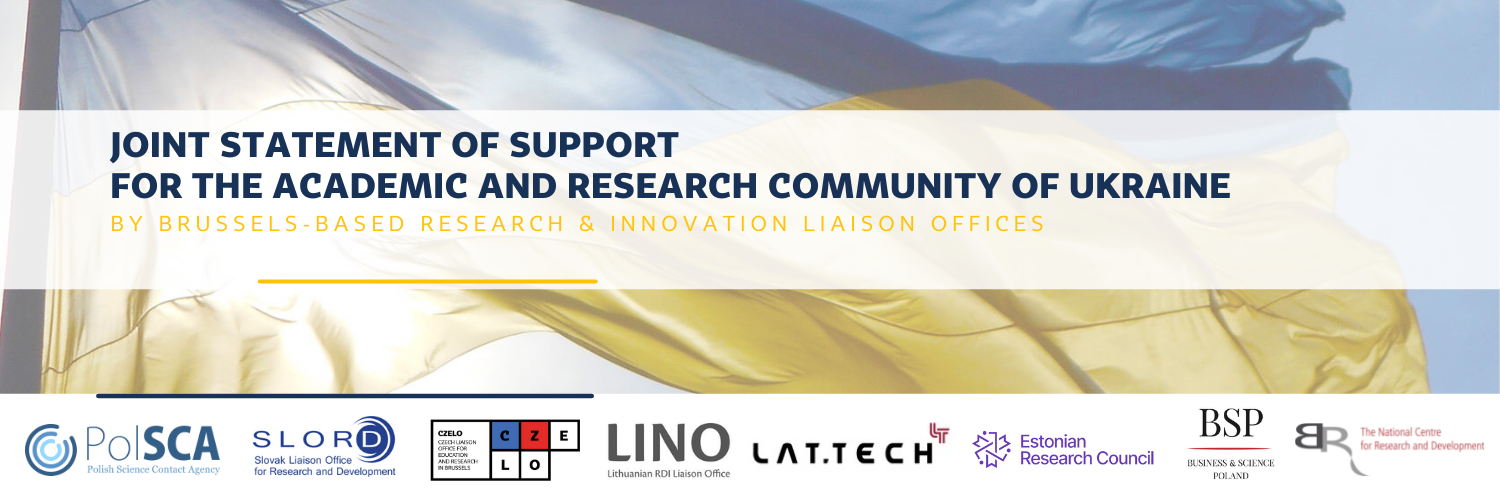
In these difficult days for Europe, we - the members of a community of Brussels-based research and innovation liaison offices - would like to express our solidarity with the people of the sovereign state of Ukraine, which on the 24th of February 2022 became a target of a hostile military aggression by the Russian Federation. In these grim days, we cannot remain indifferent and silent. With broken hearts, we are witnessing numerous casualties among innocent civilians and seeing tens of thousands forced to flee their motherland. Thus, without hesitation, we strongly condemn this unjustified invasion, occupation and destruction of independent Ukraine.
Watching the horrible scenes of this unfolding humanitarian crisis, we are deeply touched and concerned about the fate of our peers – members of the academic and research community of Ukraine. This is of particular concern to us - the first signatories of this statement, who are close to Ukraine geographically and who share with it the dark pages of violent past of the 20th century. The history that cannot repeat again.
Therefore, we feel obliged to act now. As the community of Brussels-based R&I liaison officers we cooperate with each other on a daily basis, in accordance with the principles of trust and openness, sharing and exchanging information and good practices, networking and enabling our stakeholders to strive and achieve. The European Research Area is where we work and where Ukraine and its academic and research community belongs as well.
Thus, we are fully committed to work tirelessly to make the necessary support available to all students, researchers and academics currently at risk. This involves those still in Ukraine as well as hundreds, if not thousands, who have been displaced so far and currently seek refuge. This includes vulnerable female scholars, caring for their children and elderly family members. In addition, support might also be needed to those brave individuals who speak loudly or protest against the Russian aggression over Ukraine across the neighbouring states, where freedom is not taken for granted.
We commit to work with our European partners and stakeholders to develop and implement meaningful measures such as research and mobility funding instruments, administrative care, training and other support measures. We are also considering other possible ways to provide tangible assistance aimed at supporting our peers from Ukraine.
As a community operating in Brussels, we urge the European Commission to continue acting swiftly in order to prevent further damage to the Ukrainian academic and research sector. This includes a necessary reflection on the EU research ties with the Russian Federation and other states supporting the aggression against Ukraine. Furthermore, having seen fast-track funding measures implemented in 2020 as a direct response to the COVID-19 pandemic, we would welcome similar instruments to be deployed promptly with the aim to provide adequate funding support to Ukrainian students, researchers, universities and research organisations.
As we know very well, having access to information is crucial. Therefore, we commit to engage with a view to supporting and disseminating the #ScienceForUkraine campaign as a prime example of pan-European, bottom-up and fully organic project with significant value added. It is an initiative born online, coordinated by researchers from the nep4dissent.eu COST Action, financed by Horizon 2020. It is a Twitter profile (@Sci_for_Ukraine) and a web-based resource (https://scienceforukraine.eu/) pooling together offers of support from universities, research centres, laboratories and individual scientists aimed particularly at students and researchers from Ukraine.
In times like these, we must demonstrate to our dearest friends from Ukraine that the European Research Area and European Education Area are not just EU policies, but profound and tangible European values. We need to prove it. For this purpose, we are seeking to act together with the European Commission, in particular with colleagues across the Directorates-General for Research and Innovation, and for Education, Youth, Sport and Culture, as well as the relevant Executive Agencies. We can work and cooperate in a truly European dimension, where science brings people together to make our world and our societies better for our generation and for the generations to come.
This joint statement remains open for signature by all the other counterparts concerned, especially individual members of the community of Brussels-based research & innovation liaison offices.





 A unique international forum for public research organisations and companies to connect their external engagement with strategic interests around their R&D system.
A unique international forum for public research organisations and companies to connect their external engagement with strategic interests around their R&D system.